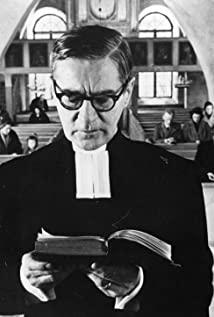Bergman’s "Silent Trilogy" or "Interior Drama Trilogy" ("Still in the Mirror", "Winter Light" and "Silence") created in the early 1960s marked his path of artistic development A new stage of: gradually getting rid of God and facing reality. If the father-son dialogue at the end of "Still in the Mirror" praises God as "love, all forms of love", and it is somewhat optimistic, then in "Winter Light", Bergman has already expressed his opinion on religion. Lost confidence, and by the time "The Silence", God had completely disappeared.
The film was originally named "Wallpaper" and later named "Still in the Mirror", which is obviously related to religion. The beginning of the film quoted a passage from Paul's letter to Corinth in the "Bible·New Testament", which contained the title "Still in the Mirror".
Although the ending of "Still in the Mirror" gives people hope, the tone is still inseparable from Bergman's favorite theme: the loneliness and pain of people, and the inability to communicate with each other.
The location of the film’s location on Faro Island in the Baltic Sea is consistent with the overall atmosphere of the film. This is a lonely island, deserted, full of rocks, and the surrounding sea is calm and waveless. Here, you can't hear the roar of the sea, and there is no such turbulent ocean momentum. It was this isolated and quiet atmosphere that attracted Bergman. When he was struggling to find a suitable location, a friend mentioned Faro Island. On a rainy day, he took a ferry to the island. He said: "I don't know why, I fell in love with this island all of a sudden. I feel that this is the scenery I dream of." His artistic concept has found a "home" here, which makes him excited. A few years later, he moved to live on the island and reveled in a peaceful, uncontested environment.
At the beginning of the film, Bergman used a large panoramic lens, from far to near, to present all the only four characters in the film to the audience in a concise way. Within 10 minutes, the relationship between the characters, their respective occupations or conditions, and the purpose of coming to the island were all explained through pictures and brief dialogues. But the key plot of Karin suffering from schizophrenia laid the groundwork for it. This fact was later told to the audience not through words but through eyes: one of her eyes appeared from behind the quilt, staring into the distance. We only saw one eye, but the expression of the eye told us everything. Bergman rarely uses "movie tricks" to emphasize visual effects, but once he uses it, the effect is very prominent. Another example is that when David was having dinner with the whole family, he was blamed by his children and felt guilty. He suddenly took a pipe with the excuse of leaving the outdoor table and wept on the wall inside. At this time, his spirit was on the verge of collapse. He stretched out his arms in front of the window, which looked like a cross from behind. Next, Bergman used his photography to project David's gray figure on the wall, which appeared to be "falling apart." Here, the connotation revealed by the picture far exceeds the meaning of language. In Bergman's image world, people can seek peace in their souls only through repentance and atonement.
Karin and Frederick could not get the warmth and love from their father. After the death of their mother, it was difficult for David to communicate with his children, as if there was an insurmountable gap between them. When David returned from Switzerland, the gifts he brought to everyone were either inappropriate or bought heavy. This vividly reflects David's lack of understanding and care for his family. Frederick and Karin wrote and acted in a one-act play to welcome their father's return. Martin served as the announcer for this "play in play", and David was the only audience in the moonlight. This play describes an arrogant artist who has no courage to sacrifice for love, and dare not go to another world to marry with the dead princess. Obviously, the prototype of this conceited artist is David. Through the creation of this little play, Frederick used a metaphorical approach to blame his father for not sacrificing his own future for love (love for his family and children), sacrificing himself for the bright prospect of becoming a famous writer.
Although David feels deeply guilty, his strong desire to become famous urges him to collect all kinds of materials for his creation by any means, including his daughter's illness, which further deepens the existing gap between him and Karin and Martin. Karin accidentally discovered that her father’s diary recorded that there was no cure for her schizophrenia. She was deeply desperate, especially when she discovered that her father had recorded her onset process and symptoms in detail as the writing material. Being greatly stimulated, he developed a rebellious psychology, refused to have any contact with the real world, and hid in his own unique little world, a world full of illusions and strange sounds. After listening to his wife's narration in the diary, Martin disliked his father-in-law. When going out on a boat with his father-in-law, in the boat he blamed his father-in-law for being indifferent to Karin's fate, and only caring about his own writing. He condemned: "You are insensitive and totally abnormal." "You are always looking for a writing topic: your daughter's neurosis. It's a fucking good topic!" "The most important thing you desire is to become a famous writer." David He retorted and asked Martin: "Can you always control what you think deep in your heart?" "How many times have you hoped Karin die?" "This is logical. You know that there is no hope for her illness, and you believe it too." It’s not necessary to let both people suffer. In this case, she’s better to die.” Here, Bergman, through Martin and David’s mutual condemnation, deeply exposes the corruption of people’s souls by money and fame. In modern capitalist society, the indifference between people. Even if this is the case between relatives, the indifference of interpersonal relationships in society is evident. The early 1960s was an important turning point in Bergman's artistic career: from "heaven" to "earth", from "God" to "human world". "Still in the Mirror" is the beginning of this turning point. His focus has shifted to the status and value of an artist in the real society. He goes deep into people's inner world to explore people's weaknesses and depression, often with a pessimistic color.
God is another theme that Bergman often touches in his films. Before the 1960s, God had supreme authority in his films, was sacred, and embodied specific moral codes. However, in the "Silent Trilogy" filmed in the early 1960s, God is no longer an idol, but has gradually become the object of suspicion and even condemnation.
Bergman uses the hallucinations and auditory hallucinations of the heroine Karin in "Still in the Mirror" to portray God as cold and unhuman. In Karin's eyes, God became the "Spider God", an unattainable shadow. When talking about this change, Bergman said: "My thoughts about God have undergone a process of development. The change starts from here (referring to "Still in the Mirror")... I see God as destructive, very Dangerous and harmful to mankind. God released the dark and destructive power of mankind, not the other way around."
But in this film, Bergman does not completely lose faith in God, but still has hope. At the end of the film, God reappears as the incarnation of "love". Please see the following paragraph of a father-son dialogue:
Frederick: I can't live in this new world, Dad.
David: No, kid, you can. But you must grab something.
Frederick: What do you catch? God? Give me a proof of God.
David: I can only give you a vague idea of my hopes. In human society, love really exists, as everyone knows.
Frederick: Of course, that is a special kind of love!
David: All kinds of love, Frederick! Sublime and low, grotesque and beautiful. Various types.
Frederick: So love proves the existence of God?
David: I don't know whether love proves the existence of God or love is God himself.
Frederick: So for you, love and God are the same thing?
David: This idea helped me when I was empty and desperate. Suddenly, emptiness became wealth, and despair gave birth to life. It's like a suspended execution, Frederick, with a suspended death sentence.
Frederick: Dad, according to you, Karin is surrounded by God because we all love her.
David: Yes.
In a film, there is such a big difference in views on life and God, and the contradiction is so prominent, which naturally arouses the attention and criticism of critics. In response to this criticism, Bergman said: "The reason is simple. There is no emotional bridge for me between the somewhat hopeful message at the end and the pessimistic color of the rest of the film." This sentence is right. It may be helpful for us to analyze the inner contradictions of this great artist. Bergman observed the indifference between people in real life, and gradually lost confidence in the role of God as the savior. However, as a serious artist, he hopes that the world will be filled with love in his heart, and put the expression of love on God. Doesn't this contradiction between reality and ideal reflect the inner distress of a great artist?
View more about Through a Glass Darkly reviews











